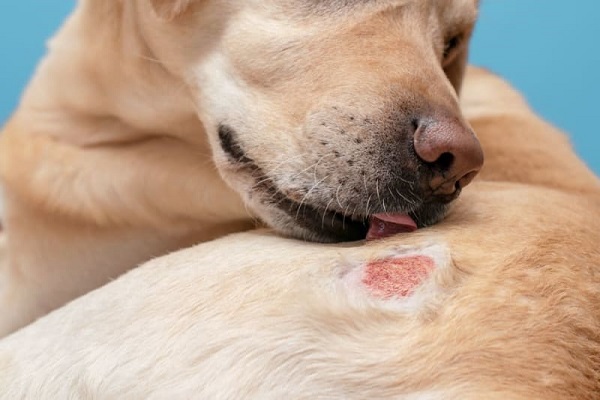Excellent Facts To Deciding On Kidney Failure In Cats
Excellent Facts To Deciding On Kidney Failure In Cats
Blog Article
What Are The Ways That Cat And Dog Skin Allergies Helped With Probiotics?
Probiotics play a significant part to play in managing skin allergies, as well as relieving allergies in dogs. These beneficial microorganisms help maintain a health microbiome within the gut, which supports the skin's and overall immune system. How probiotics reduce the symptoms of allergies to dogs' skin:
Immune System Regulation
Immune Balance:
Function: Probiotics help regulate the immune system by promoting the growth of beneficial bacteria and inhibiting harmful bacteria in the intestine.
Benefits: A healthy immune system helps reduce hypersensitivity reactions, which can lead to skin allergies. This decreases the severity and frequency of allergic reaction for pets.
Inflammation Reduction
Anti-inflammatory Effects:
Function: Certain strains of probiotics can produce anti-inflammatory substances and alter the body's inflammatory responses.
Benefits - By reducing systemic swelling, probiotics help to ease itching, inflammation, and other symptoms that are associated with allergic reactions.
Gut-Skin Axis
Improvement of Gut Health
Function: The gut's surface Axis is a reference to the relationship between gut health and skincare health. Probiotics may improve the gut barrier as well as digestive health.
Benefits Healthy guts help to prevent the release of toxins and allergies into the bloodstream, which can trigger skin reactions. This may result in a decrease in skin allergy symptoms.
Strengthening Skin Barrier
Enhanced Skin Barrier Feature:
Function: Probiotics influence the production of ceramides and other lipids that are essential to maintain the health of the skin barrier.
Benefits: A thicker skin barrier protects against environmental allergens and pathogens and reduces the risk of skin infections as well as allergic reactions.
Allergy Symptom Management
Pain Relief:
Function: Probiotics can be used to help with symptoms through the modulation of release of histamines, as well with other chemicals that are that are involved in allergic reactions.
Benefits for pets: This treatment may alleviate itching and other signs of skin allergies.
Increased Microbial Diversity
A heightened diversity of microbes:
Function: They boost the diversity within the gut microbiome. This is crucial to ensure that the immune system is well-balanced.
Benefits A diverse microbiome helps overall health and the health of your skin. It accomplishes this by preventing harmful bacteria from accumulating and causing allergic reactions.
Particular Probiotic Strains
Lactobacillus or Bifidobacterium are two popular probiotic strains that have been proven to be effective in combating skin allergies in animals.
LactobacillusrhamnosusGG has been praised for its role in promoting gut health and reducing allergies.
Bifidobacterium aegypti: It helps to reduce inflammation and improve the immune response.
Usage Aspects
Dosage & Administration: The right dosage of probiotics will depend on the pet’s weight, size, and health needs. Follow the directions on the package or that your veterinarian will provide.
Formulations: Probiotics can be found in various forms for dogs like capsules, powders and chews. Select a product that's safe and effective for your pet.
Monitoring and Side effects: Although probiotics are safe in general, it is important to monitor your pet for any adverse reactions, such as digestive upset. By starting with a low dosage and increasing it gradually, you can minimize any side effects.
Check out the following article for more details.
By regulating the immunity system and reducing swelling, as well as improving the skin barrier and overall gut health, probiotics can help to manage skin allergies. Regular use of probiotics may help reduce the symptoms of allergic reactions in pets, promote healthier skin and enhance their quality of living. View the top rated collagen for dogs blog for more info including pet immune system supplements, pet dental health, pet allergy relief, pet supplements for pets with skin tumors, pet supplements for pets with ear infections, pet supplements for pets with weak bones, pet supplements for pets with elbow dysplasia, pet glucosamine supplements and more.
What Can Quercetin Aid In Treating Skin Allergies In Dogs As Well As Cats?
Quercetin (a natural flavonoid) is a flavonoid that can be found in a variety of fruits, vegetables and other food items. It has been shown to ease skin allergies in cats and dogs. The following is a description of how quercetin aids in managing allergic skin conditions in pets:
Anti-Inflammatory Properties
Reduce Inflammation
Function: Quercetin inhibits pro-inflammatory histamines, cytokines and the release of these substances.
Benefits: Quercetin may help reduce inflammation caused by allergies to the skin, decreasing redness and swelling.
Antihistamine Effects
Natural Antihistamine:
Quercetin is a substance that inhibits histamine release by mast cells. Histamines are a chemical that can trigger itching and other allergic symptoms.
Benefits As a natural antihistamine quercetin reduces itching and can also help in allergies of other kinds. This is why it's beneficial for animals suffering from allergies.
Antioxidant Activity
Oxidative-Stress Reduction
Effect: Quercetin has a strong antioxidant effect that neutralizes free radicals, and helps reduce oxidative stresses.
Benefits The reduction of oxidative stress can aid in protecting the skin's cells from harm, aid in healing, and maintain overall skin health.
Immune System Modulation
Balanced Immune Responses:
The function: Quercetin modifies the immune system, resulting in an effective and balanced reaction to allergens.
Benefits: A balanced immune system prevents overreactions to allergens. This reduces the frequency and severity of allergic flares.
Improvement of the skin barrier function
Strengthening Skin Barrier:
Function: Quercetin is essential in maintaining healthy skin barriers by helping to produce ceramides.
Benefits: A thicker skin barrier will protect you from environmental allergens. This will reduce the risk of suffering from allergies or getting infections.
Allergy Symptom Management
Treatment of Symptoms:
Function: Quercetin reduces inflammation by blocking the enzymes responsible for it, including Lipoxygenase.
Benefits: This leads to the reduction of symptoms such as itching, swelling and redness which provides comfort and relief for pets.
Use and considerations
The dosage of quercetin that you apply depends on the size, weight and overall health condition of your pet. It's important to follow the veterinarian's recommendations or the product directions on the label. Quercetin can be combined with bromelain for increased absorption.
Formulations: Quercetin supplements for pets can be found in different types, such as capsules tablets, and powders. To ensure safety and efficacy it's essential to select an animal-specific, high-quality product.
Quercetin can cause adverse reactions. It is generally safe but excessive doses could cause upset gastrointestinal system in certain pets. You can minimize side effects by starting at the lowest dosage, and then increasing it gradually. Be sure to keep an eye for any possible side symptoms, such as vomiting or diarrhea.
Conclusion
Quercetin has been proven to be an effective supplement in the management of skin allergies. Its antioxidant properties and antihistamine effects minimize itching, inflammation, and oxidative stress. It also helps in improving the barrier to skin, modulating immune response, and enhancing the quality of life of animals with skin allergies. Qurcetin's regular use can help significantly alleviate allergic symptoms. It may also help enhance the general health of the skin as well as improve the quality of life for animals suffering from skin allergies. Take a look at the top rated natural dog probiotics tips for more info including herbal pet supplements, pet anxiety supplements, pet milk thistle supplements, pet supplements for pets with fear of loss, pet supplements for pets with skin conditions, kidney support gold, pet hemp supplements, herbal medicines for dogs and cats and more.
How Can Apple Cider Vinegar Be Used To Treat Yeast Infections In Dogs And Cats?
ACV is often used to treat yeast infections in dogs and cats. ACV is acidic and may cause adverse reactions. While some anecdotal or scientific evidence suggests its benefits, you should use it under the guidance by a veterinarian due the possibility of adverse effects and its acidic nature. Here's how ACV can be thought of as helping with yeast infections:
Antifungal Properties
Acidic Environment
ACV's acidity ranges from 2.5-3.0 pH. The acidic pH can hinder yeast growth.
Benefits: Applying ACV in its dilute form on your pet's skin or ears, as well as adding it to bath water, can help reduce yeast.
Control of pH levels in the skin
Balancing Skin pH:
ACV's function is to balance skin pH, which supports an endocrine-healthy barrier on the skin and impedes the growth of yeast.
Benefits - Maintaining the pH balance of the skin is a fantastic way to avoid yeast infections and maintain overall skin health.
Anti-inflammatory properties
The reduction of inflammation
ACV's anti-inflammatory properties, mild and gentle, are the main reason for its use.
Benefits: Reducing swelling may reduce symptoms associated with yeast infections such as irritation, discomfort and redness.
Support for Digestive Health
Internal Use
Function: When inhaled (in tiny amounts and with a high level of dilute), ACV is thought to promote digestive health and regulate gut flora.
Benefits of a healthier gut environment: Through supporting the immune system and maintaining microbial equilibrium A healthy gut can limit the overgrowth of yeast.
Use and Considerations
Topical Application: Apply ACV in diluted form with water (typically 1 part ACV for 1-2 parts water) in a spray or rinse on the affected areas of the skin or ears. Avoid applying it to open wounds and sensitive skin.
Consult your veterinarian before using ACV internally. ACV must be highly diluted (1 teaspoon to 1 tablespoon in a cup of water) and given in small doses to prevent gastrointestinal discomfort or upset.
When using ACV topically, be on the lookout for signs of irritation and allergic reactions. Do not use it if any adverse reactions occur.
A consultation with a veterinarian Before applying ACV to treat yeast infections, consult with your vet. They can offer advice on proper dilutions, application methods and possible risks, based on the specific health needs of your pet.
Click here to read the complete article.
While apple cider vinegar may provide benefits in the treatment of yeast infections in cats and dogs However, its use must be approached cautiously and under the supervision of a vet. ACV might have mild anti-inflammatory and antifungal effects because of its acidic nature. But, a proper dosage and cautious application are vital to avoid irritation or adverse reactions. ACV is safe and efficient when administered under the supervision of a veterinarian as part of a complete treatment program for yeast infection in pets. View the best treatment for cushings disease in dogs recommendations for site recommendations including pet ear supplements, pet energy supplements, pet supplements for pets with fear of being alone, pet supplements for pets with fear of illness, pet omega-6 supplements, pet supplements for pets with skin infections, premium quality pet supplements, pet supplements for pets with dry skin and more.